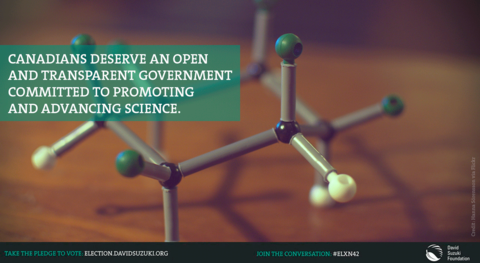Dissecting the cuts to Canadian science

(Credit: Hanna Sörensson via Flickr)
For several years I've written open letters and articles about the important place science holds in our society, particularly with respect to public policy and culture.
The election period in which we now find ourselves is an opportune time to revisit the role of science in decision-making. Unfortunately, like many other critical issues, science has lost out almost entirely to a focus on the economy.
So, allow me to bring science back into the conversation.
How is science holding up in Canada?
Here's just a small sample of some federal government decisions that have affected our scientific capacity over the past several years:
The abolition of the National Round Table on the Environment and the Economy;
The abolition of Hazardous Materials Information Review Commission;
Ending funding for the Canadian Foundation for Climate and Atmospheric Sciences;
Programs such as the monitoring of contaminants and marine toxicology have been abolished, or seen their funding greatly reduced, as is the case for the research centre on oil, gas and other sources of offshore energy;
The closure of the Polar Environment Atmospheric Research Laboratory (PEARL) in Nunavut (later reopened);
Gutting of legislation that protected fish and endangered species;
Cutting the funding to the Experimental Lakes Area -- a one-of-a-kind natural laboratory that played a pioneering role on acid rain research. (Luckily, the ELA was saved by an agreement between Ontario and the International Institute for Sustainable Development.);
The closure of seven libraries run by Fisheries and Oceans Canada along with libraries run by Natural Resources Canada, Environment Canada and Health Canada;
Abolition of the mandatory long-form census from Statistics Canada;
The muzzling of government scientists.
Although this list is nowhere near exhaustive, it still paints a stark picture of how science, and everything that depends on good evidence, has been battered in recent years. According to a report from the Professional Institute of the Public Service of Canada, $596 million in science and technology budgets and the equivalent of more than 2,000 positions between 2008 and 2013 have been cut.
Clearly science funding was the "odd man out" in terms of federal government priorities in recent years. This fall's election campaign gives us an opportunity to reignite the conversation around the role of science in our democratic process.
This isn't about politicizing science, because it needs to remain neutral and objective, but instead ensuring that all our political leaders and all our political parties have the courage to restore science to its rightful place.
With the many critical challenges on the horizon including climate change, changing demographics, advancements in information and technology, and issues around our health and our economy, we must ensure science is well-funded and at the cornerstone of our decision-making.
As voters, we have the power to make a difference in this critical conversation. Let's exercise it.
YES, I'm voting on October 19.
Hey! Want more DSF? Join David Suzuki on Facebook

David Suzuki's Blog
- David Suzuki's profile
- 247 followers



